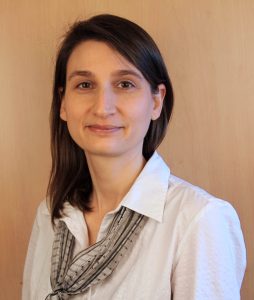Immunology Researcher Optimizes Immunotherapy to Improve Outcomes of Respiratory Viral Infection
April 2023
By Christina Kittipatarin and Kathleen Snoeblen

Figure 1. Assistant Professor Tara Strutt, UCF College of Medicine, Burnett School of Biomedical Sciences.
As a cellular immunologist, UCF assistant professor Tara Strutt knows very well what cytokines—part of the body’s defense against pathogens—can do. “Cytokines can do good things, and they can do bad things,” she says. For example, during severe infections, an overactive immune response can trigger a cytokine storm, a condition in which excess cytokine production leads to uncontrolled inflammation. This hyperinflammation can ultimately cause tissue damage and organ failure.
A researcher at the Burnett School of Biomedical Sciences, Strutt has developed a technology that uses cytokines in a controlled, targeted manner to fight infections and promote healing.
Before joining UCF in 2015, Strutt was an assistant professor at the University of Massachusetts Medical School. She completed her post-doctoral work at the Trudeau Institute in New York.
Strutt’s interest in infectious disease started during her graduate training at the University of Saskatchewan. At UCF, Strutt is studying CD4 T-cells and how they function to protect against respiratory viruses, including Influenza A virus (IAV). “CD4 T-cells are the orchestrators of the immune response,” she said. Also known as helper T-cells, CD4 T-cells produce and secrete specific cytokines that act as immune system messengers. During an IAV infection, subsets of CD4 T-cells become activated and start to produce and secrete the cytokine interleukin-2 (IL-2).
IL-2 is a potent T-cell growth factor that has both proinflammatory and anti-inflammatory effects. Under normal conditions, the production of IL-2 is tightly regulated. IL-2 can have beneficial (regulatory and reparative) effects as well as inflammatory tissue-damaging effects. The outcome depends on the specific cell type that is receiving and responding to the IL-2.
Controlling Inflammation to Ensure Healing
A new therapy developed by Strutt aims to use IL-2 in a controlled manner for treating acute respiratory viral infection. IL-2 is currently approved for cancer immunotherapy. One of the challenges of IL-2-based cancer therapy is the numerous off-target effects that can result in organ and tissue damage.

Figure 2. Biomedical Sciences Ph.D. candidate Mishfak A.M. Mansoor, a student member of the Strutt laboratory in UCF College of Medicine, Burnett School of Biomedical Sciences.
To address the challenge of developing an IL-2-based antiviral therapy, Strutt’s team is directing IL-2 to particular subsets of immune cells. She refers to this approach as “targeted IL-2.” When targeted, only immune cells that express a specific version of the IL-2 receptor can respond to the cytokine. These cell populations include those that 1) temper inflammatory responses, 2) promote tissue repair, and 3) participate in the antiviral immune response. In animal studies done in the Strutt laboratory, improved outcomes, including improved respiratory function and reduced airway inflammation, are seen when “targeted IL-2” is administered during influenza virus infection. Targeted IL-2 “ramps up regulatory processes but importantly does not interfere with the antiviral immune response.”
Additionally, the use of the “targeted IL-2” has a beneficial role in forming “memory CD4 T-cells.” These CD4 T-cells protect against pathogens previously encountered by infection or vaccination. This application has the potential to improve the immune responses stimulated by vaccines.
Strutt hopes that her research provides greater insight into developing safe, innovative vaccine formulations, and immune-based therapies for respiratory viral infections.
This work is supported by an NIH National Institutes of Allergy and Infectious Diseases R01 award.
For more information about the invention, see the technology sheet.
Technology Available for License
To learn more about Strutt’s work and additional potential licensing or sponsored research opportunities, contact Benjamin Neymotin (benjamin.neymotin@ucf.edu) at 407.823.0665.